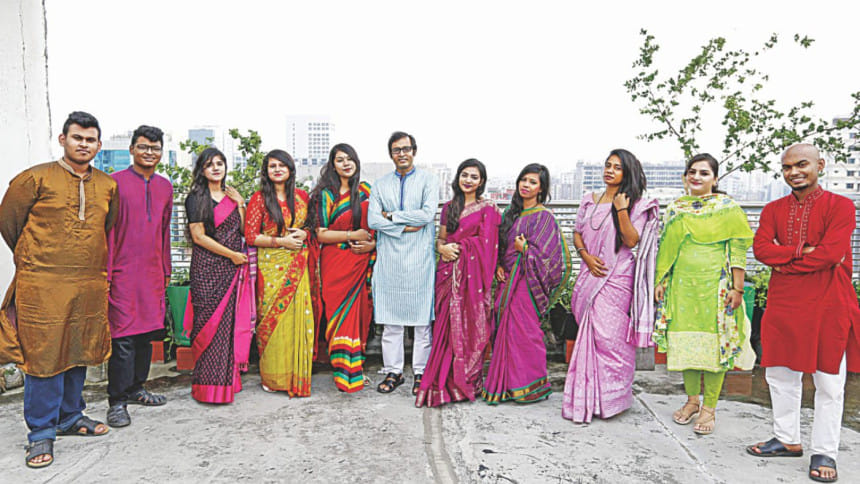Reminiscing The Legacy Of Nazrul

Kazi Nazrul Islam's works have been known to explore themes such as love, freedom, and revolution. His greatest legacy is of opposing all kinds of bigotry, including religious and gender, and encompassing these strong feelings into his words and melodies. The Rebel Poet wrote short stories, novels, and essays but is best known for his poems and songs, in which he pioneered Bengali ghazal.
The Nazrul Institute plays a pivotal role in promoting the literary works of the poet, teaching Nazrul Sangeet with maintaining the proper melodies and swaralipi, and recognising excellence in literary research and conferring awards.
In a recent vibrant 'adda' with The Daily Star, Shahid Kabir Polash, a teacher at Nazrul Institute, and his students Zarif Ikram, Toma, Shubho Karmakar, Shara Bani, Tabassum Porna, Salma, Nowshin Kabir, Sadia Tabassum, Arham Sadaf and Ishrat Jahan Mim discussed the importance of promoting Nazrul Sangeet and how the current generation can continue to spread the National Poet's legacy.
“Young participants on reality shows, and musical shows tend to lean towards Nazrul Sangeet while performing. It goes to show how much his popularity still persists among the masses. Singing a Nazrul song will automatically prove your standard as a singer. I see this spark of passion towards the Poet's works in my students as well,” says Polash.
Salma adds: “We consider ourselves lucky to be able to delve deeply into the works of Kazi Nazrul Islam. Our teachers at the institute are well-learned; they maintain the authenticity of Nazrul in their tutelage. And through such dedicated teachers, we can hope to carry the torch one day.”
When it comes to authenticity, while there have been incidents of singing the wrong tunes, Nazrul enthusiasts across the country took it upon themselves to resolve the situation. “We at Nazrul Institute, including other institutions like Nazrul Academy, Chhayanaut and BAFA, try our best to practice the original swaralipi (notations) of the melodies. These institutions made it a point to find the authentic melodies and words and release these records to the public,” says Polash.
In Bangladesh, Nazrul's popularity is unparalleled. But the importance of taking his works to a global stage still exists. Shubho says “Taking Nazrul to an international level is taking the country on an international arena. His literary works should be translated properly. His poems like 'Bidrohi' or 'Chol Chol Chol' instil a fire within us. If translated, we could spread this love and passion across the globe.” On that note, Polash adds, “The media is doing good work in promoting Nazrul in this regard. During Nazrul Jayanti (birth anniversary), they play his tunes, his poetry and also television dramas based on his stories.”
Lakho Konthey Bidrohi Kobita, held at Dhaka University's central playground was one of the most elaborate celebrations of Nazrul Jayanti so far, where many schools, colleges and universities also held simultaneous events. “Initiatives like this will inspire more of the youth and pique their interest in the wonders of Nazrul's work,” says Shara Bani.
We can also see how in recent years more and more songs, some less-heard-of, are now being popularised by enthusiasts across the country. According to Polash, “A decade back, it was only the popular songs that would be performed and practised over and over again. But in recent years, enthusiasts have taken it upon themselves to perform a more diverse variety of his songs. We make sure that if we perform, say, 10 songs, five of them will be the more popular ones, and the other five will be those that we will make popular. Almost 300-400 Nazrul songs are regularly played, practised and performed countrywide now.”
But the problem of new artistes and record labels is one that the youth has to face. “The CD market is dull now. There is no proper platform for the younger generation, and if we have to record, we have to do it with our own money. Many listeners have not moved on with technology to the internet, like YouTube. No one buys CDs anymore. How will producers work with us if they cannot sell their CDs?” questions Polash.
Another persisting problem, Shara Bani believes, is the lack of enthusiasm amongst audiences. “The kind of audience that can appreciate Nazrul is decreasing by the day. Fusion, pop and genres as such are more popular amongst the masses now. But classical and pure music is being lost, along with the audience to appreciate it.”
On that note, his student, Zarif Ikram, says, “YouTube is now more popular. I think it is time for us younger Nazrul artistes to see this as an opportunity. Performing, recording and uploading Nazrul Sangeet on YouTube will help spread our love for Nazrul far and wide.”

 For all latest news, follow The Daily Star's Google News channel.
For all latest news, follow The Daily Star's Google News channel. 



Comments